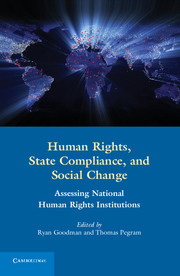Book contents
- Frontmatter
- Contents
- Contributors
- Preface
- 1 Introduction
- PART I NHRIs in Theory and Reality
- PART II NHRI Performance
- 5 National Human Rights Institutions and the International Human Rights System
- 6 National Human Rights Institutions in Anglophone Africa
- 7 National Human Rights Institutions in the Asia Pacific Region
- 8 National Human Rights Institutions in Central and Eastern Europe
- 9 National Human Rights Institutions in Latin America
- PART III NHRIs and Compliance
- PART IV Final Reflections
- Annex 1
- Index
- References
9 - National Human Rights Institutions in Latin America
Politics and Institutionalization
from PART II - NHRI Performance
Published online by Cambridge University Press: 05 June 2012
- Frontmatter
- Contents
- Contributors
- Preface
- 1 Introduction
- PART I NHRIs in Theory and Reality
- PART II NHRI Performance
- 5 National Human Rights Institutions and the International Human Rights System
- 6 National Human Rights Institutions in Anglophone Africa
- 7 National Human Rights Institutions in the Asia Pacific Region
- 8 National Human Rights Institutions in Central and Eastern Europe
- 9 National Human Rights Institutions in Latin America
- PART III NHRIs and Compliance
- PART IV Final Reflections
- Annex 1
- Index
- References
Summary
Introduction
This chapter offers an in-depth study of the institutionalization of national human rights institutions (NHRIs) in Latin America, institutions that are often created under adverse political conditions. The analysis demonstrates the variable institutionalization of the Iberian model of the NHRI – the Defensoría del Pueblo – showing its distinctive political accountability function as a potential bridge between state and society. More specifically, relying on extensive primary material, including interviews with key participants, the analysis disaggregates the formal and political dimensions that shape NHRI institutionalization within Latin America. The empirical evidence assembled here indicates that development of formal design principles is important in explaining Defensoría institutionalization. However, the political dimensions of the Defensoría’s interactions with organized state and social actors are often decisive.
The chapter adopts a distinct understanding of institutionalization, one that incorporates not only formal design principles but also the ability of informal rules, norms, and practices to decisively shape behavior and outcomes. Investigation into the political significance of informal rules, norms, and practices animate some of the most promising contemporary scholarship on democracy. The analytical framework for evaluating the development of NHRIs in Latin America’s democratic regimes focuses on three interrelated, but distinct, features of institutionalization: formal design principles, relations with organized state and social actors, and rules of access across institutional arenas. This frameworks draws upon political accountability theory to locate the position of the Defensoría in relation to three significant clusters of actors: vertical (executive branch), horizontal (state checks and balances), and social (organized civil society).
- Type
- Chapter
- Information
- Human Rights, State Compliance, and Social ChangeAssessing National Human Rights Institutions, pp. 210 - 240Publisher: Cambridge University PressPrint publication year: 2011
References
- 3
- Cited by

